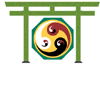
A Book of Little Traditions

|
minzoku NEO-shintô A Book of Little Traditions |
|
|
ToC |
||
|
Blog — 20
Pulled Over By The Shinto Police
I just had a very odd interaction with an essentialist practitioner of shintô. In spite of the fact that I always make it very clear that I practice minzoku NEO-shintô and that I am not a 'licensed professional' priest, he seemed to think that I was claiming to be representive of jinja shintô.
That I was "just making it up as I went along and calling it good", and that I was somehow leading impressionable naive young people away from the 'purity' of jinja shintô. He also seemed to believe that what I was practicing wasn't shintô.
This is what frequently happens when a essentialist practitioner — usually of jinja shintô — runs into an existentialist practitioner — usually of minzoku shintô. (See Thomas P. Kasulis's Shinto: The Way Home, Table 1 for a comparison of the differences) Not that all practitioners of jinja shintô are essentialists; I've run across many that were more existential in their outlook.
shintô is based on neither belief or intellectualism, instead it is rooted in practices that spring from authenticity — from the heart. As such it does not require that one be a professional or "licensed" to practice it — the vast majority of practitioners aren't.
Granted many of the larger shrines in Japan are currently run by "licensed" professionals, but certainly not all of them. In fact there are barely enough "licensed" professionals to staff a quarter of the 80,000 some shrines. And the term "licensed" is not entirely accurate. Licensed means officially or legally permitted; a more accurate term would be certified, which means that a certain level of ability is being guaranteed by the certifying body — which is assuming that said body is trustworthy.
As someone from peasant stock, I have to say I have a bit of a problem with "professionals". My primary responsibility is to my community; it is my duty to do the best I can with what I have — the Japanese phrase 'ganbatte' sums it up.
Too many professionals seem to have their primary responsibility be to their professional organization; a self-perpetuation of their status. I understand the need for a bar, but the bar frequently seems set high more as an effort to limit competiton than from concern about the quality of services rendered.
As for the charge of, "making it up as I go along, and calling it good", at some point every single practice in shintô was "made up by someone as they went along". Existentialists have no problem with making it up. They experiment and pragmatically adopt whatever works. Tradition is fine, but it doesn't cover everything new; what does tradition say about handling problems like ecological disasters, over-population, and rapidly changing technologies?
And I'm not the one who calls it good; my community and the kami are the ones who make that determination. If they don't like what I do, they let me know, I stop doing it and do something else.
95% of my set of practices are firmly based in shintô — I can pretty much quote you chapter and verse on the various sources (if you doubt me, check out the bibliography). The fact that they don't match anyone else's is hardly a condemnation, given that almost no one's matches anyone else's. From an existentialist viewpoint, if many of your practices are shintô practices then you are a shintô practitioner.
On the issue of purity of shintô , I would like to point out that jinja shintô would be better called jinja shintôs. Each shrine has their own set of practices; frequently even when that shrine is a branch of a superior shrine. There is no one set of universal practices, no dogma, no commandments, and no central organization. This multiplication of sets of shintô practices extends down to the individual families (and even to the individual).
When an essentialist talks about the "purity of shintô", what he really means is his particular set of practices.
For that matter, shintô itself is a complex weave of ancient practices; local customs; indigenous folk religion; folk magic; unoffical expressions of organized religions by lay people; and foreign Buddhist, Esoteric Buddhist, Religious Daoist, Confucian, and Neo-Confucian practices and ideas. The shear scope of its syncretism places it firmly within the existential category. The one thing it is not is pure.
And regrettably essentialists frequently either discount other sets of practices as 'not being the real thing', or simply refuse to let practitioners of those differing sets of practice 'show up at the table'. This insistence on a single way of practice only serves to fragment a community rather than unite it.
Finally, I'm hardly leading anyone astray. When I help someone understand a topic, I don't present just one way of looking at it; but rather give multiple viewpoints, not just my own.
Of course this does tend to drive many of my 'students' to distraction — but then if they didn't want to know, they shouldn't have asked. So if presenting options and giving enough information to make an informed decision is "leading the naive astray", then yes, I'm guilty and proud to be so.
|
||
|
|